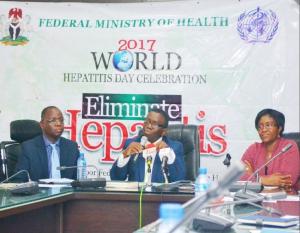Nigeria Employs Numerous Strategies to Create Awareness on Viral Hepatitis Nationwide
Abuja,03 August 2017-The Federal Ministry of Health (FMOH) and World Health Organization (WHO) are leading other stakeholders to create more awareness on viral hepatitis and give nationwide visibility to eliminate the deadly disease in Nigeria.
Nigeria has a high burden of Viral hepatitis B and C at a prevalence rate of 11.2% and 2.0% respectively. The World Health Organization (WHO) supported Nigeria to develop and launch a National policy, strategic plan, treatment guidelines and training documents for viral hepatitis. Lagos, Taraba, Rivers, Nassarawa have also established a state-level programmes to tackle the disease among the states’ residents. The country has a high hepatitis B virus (HBV) vaccination coverage among children although birth-dose coverage is sub-optimal. Screening and vaccination coverage among adults remains unsatisfactorily low due to a lack of awareness among the general populace and health workers, low coverage of testing facilities, high cost of laboratory investigations and medications for those needing treatment.
To amplify the campaign towards elimination of the disease, a week-long activities to commemorate the 2017 commemoration of World Hepatitis Day with the theme, ‘Eliminate Hepatitis’ across the country were conducted. In a Press briefing to launch the awareness campaign, the Minister of Health, Professor Isaac Adewole in Abuja observed that “awareness of the disease is gathering momentum however a lot more needs to be done”.
According to him, the Federal government is committed to making available hepatitis preventive and treatment services in all health care facilities. He therefore urged the media to scale up dissemination of correct hepatitis information for widespread enlightenment.
The minister advises all Nigerians to get tested for hepatitis and those found to be negative, to get vaccinated, while those with the infection should be treated, stressing that the country already provides HBV vaccination as part of the national immunization schedule for children and adults. In addition, the country screens for HBV and Hepatitis C virus (HCV) in all donated blood for transfusion and has a policy for injection safety, which is enforced in all health care facilities. He called on WHO, the Society for Gastroenterology and Hepatology of Nigeria (SOGHIN) and CHAI not to relent in providing technical and financial contributions for the fight against the disease.
Technical experts and community-based organization in the country used the occasion to call on the WHO to expand assistance to the country in its fight against the disease by leveraging on the available HIV infrastructures in order to reduce cost of treatment for patients. The PCR machines used for HIV viral load could also be used for Hepatitis Viral load. Additionally, they called for integrated supply chain mechanism for HIV to include drugs for Viral Hepatitis.
Dr Rex Mpazanje who represented WHO at the Press briefing commended the Nigerian government in its effort towards elimination of viral hepatitis. He eulogized the technical experts and other stakeholders for their efforts, and urged for more advocacy efforts in that regard. He maintained that there is need to build capacity of health workers at all levels to cope with demand for screening and vaccination services.
The 2017 commemorative events included TV and Radio appearances on major TV stations, a road show including screening and vaccination campaigns in Lagos, Rivers, Taraba, Nassarawa, Niger, Osun, Enugu and the Federal Capital Territory.
Five strains of the virus, Hepatitis A virus (HAV), hepatitis B virus HBV, HC), hepatitis D virus (HDV) and hepatitis E virus (HEV) are responsible for most cases of viral hepatitis, which is an inflammation of the liver due to a viral infection. All the viruses can cause acute hepatitis, but only HBV and HCV frequently cause chronic hepatitis, which can lead to scarring of the liver (cirrhosis) and primary liver cancer.




